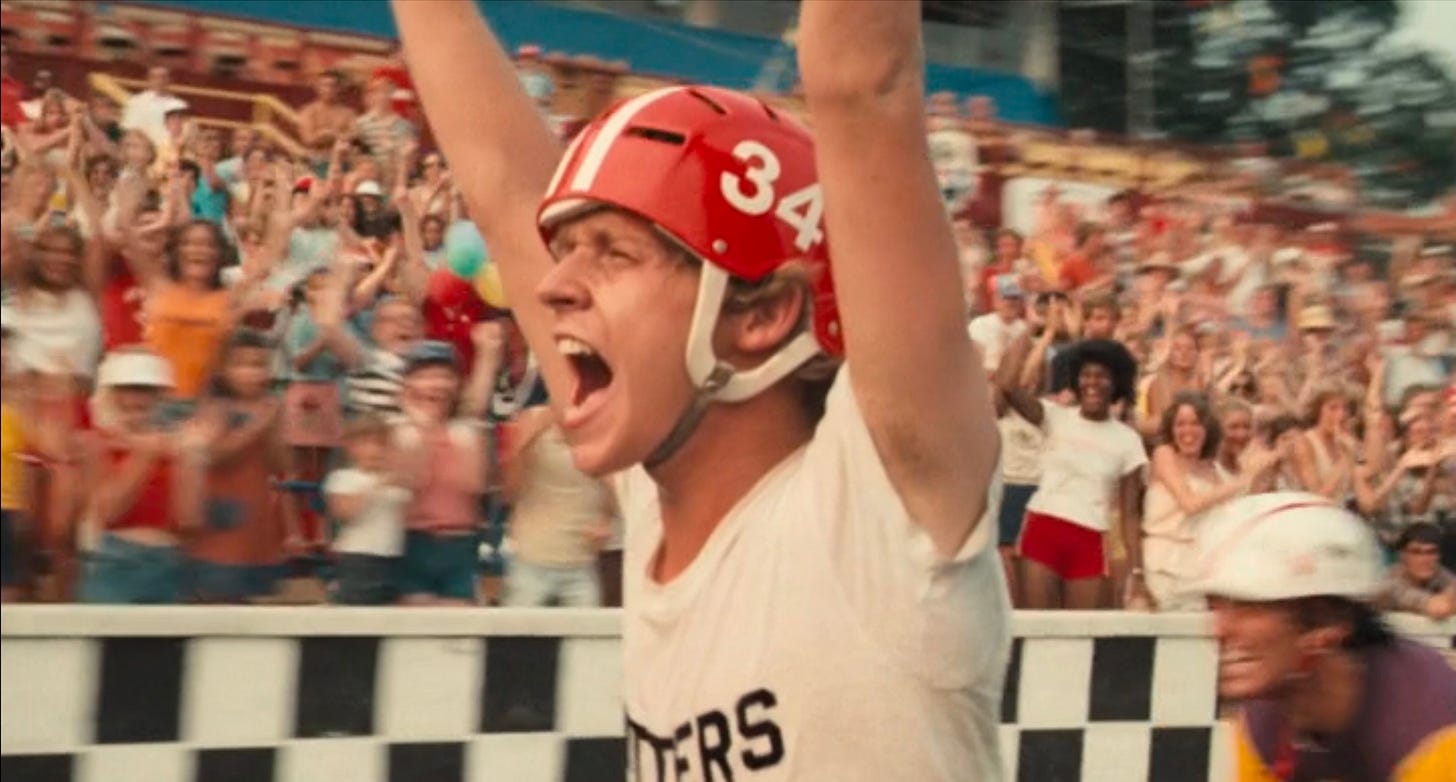Everybody loves a good underdog story. Rocky Balboa stood up to Apollo Creed. "Rudy" Ruettiger made the Notre Dame football team despite "hardly a speck of athletic ability." The Bad News Bears, the Mean Machine, and the Charlestown Chiefs rose from obscurity, as did Hickory, the Mighty Ducks, and Rachel Phelps' Cleveland Indians. Danny kicked Johnny in the face. The Average Joes beat the Purple Cobras.
David Stohler and his friends won the Little 500.
We cheered them all.
Why?
Certainly, the storytellers set the underdogs up to draw our allegiance, but that only works because there's something more than simply being told "you should side with X in this conflict.
The underdog wins our support and loyalty by demonstrating certain qualities. Among those are hard work, perseverance, motivation, and desire. We empathize with the harder road they travel and the greater challenges they overcome. Watch a one-on-one basketball game between a five-foot-eight player and someone who's six-foot-six, and you reflexively want to see the shorter player succeed.
But, that's not all.
The path is essential to the underdog story. If the shorter player or weaker team gets spotted several points, or given some sort of "leveling" advantage, do we cheer them on as much? Or is there less to admire? Would there be a story if everyone who played alongside Rudy, good or lousy, also made the Notre Dame roster, a la "participation trophies?" If Apollo Creed was a middleweight instead of a heavyweight, so that Rocky's disadvantages were balanced out, would we cheer for him as hard?
No. The "underdog wins out" trope relies on the underdog playing the same game or running the same race as everyone else. Tipping the field in favor of the underdog doesn't satisfy.
Nor does it do the underdog any favors. It's nice to win, but winning with assistance cheapens the victory and removes the underdog's opportunity to prove his greater desire, his harder work, or his more powerful motivation.
Yet this is exactly what society does nowadays, to anyone whose identity markers designate him or her as the underdog. Or, the "oppressed" party, if you prefer the preferred language. Whether it be affirmative action, the grievance hierarchy, or the assumption of who’s "correct in an interaction, the current narrative is that we should presume an oppressor-oppressed dynamic, and side with the oppressed no matter what.
Elon Musk pointed this out in an interview with Ben Shapiro:
I think we need to stop this principle that the normally weaker party is always right.
This "weaker party is always right" notion is how we end up with non-prosecution of criminals in blue cities, allying with Hamas over Israel, and acceding to ever-more-outrageous demands from the extreme members of favored identity groups.
Merit is at the core of underdog stories, but it is not only ignored or dismissed in modern social dynamics, those who defend merit are themselves attacked as racists, bigots, and wrong-thinkers. Merit is, however, the fairest metric. As personal as it is, it is also "impersonal." Merit doesn't care about your skin color or your ethnicity or your orientation. Merit notices when you overcome innate disadvantages such as height, or circumstance disadvantages such as the demographics of your birth, but it doesn't reward you just for the fact of those disadvantages.
That merit is "free market," rather than centrally planned or dictated, probably contributes to the Left's distaste for it. People who reflexively trust mom-and-pop businesses more than big corporations send a signal that "we want you to succeed just enough to stay the size you are. If you are too successful, you become evil.” People who like the notion of being supported by Other People's Money have, I dare say, less personal motivation or drive than those who seek to succeed and overcome whatever obstacles life throws at them by themselves and on their own terms.
Merit grows societies and benefits all within. Merit will always result in inequality, but even in that inequality, wealth grows and the whole is better off. Its opposite, whatever we might call it, produces poorer societies that stratify into a large mass of "equally poor," overseen by a small group of elites that live much better lives than those masses. There's a reason that those more egalitarian European nations have lower overall standards of living than Americans enjoy, and there's a reason that socialistic states have failed in every combination of circumstances imaginable.
Merit looks at two parties, and may notice which is stronger and which is weaker, but doesn't grant the weaker party preference.
Would you rather have your bridges or airplanes designed and built by people who completed rigorous engineering programs, or by people who were deemed in need of a leg up and given easier curricula and graded on a curve?
We didn’t cheer the Cutters’ victory because they were townies racing against rich college kids. We cheered them because David Stohler trained his ass off, and persisted even after his starry-eyed naivety was shattered by Team Cinzano.
If you haven’t seen Breaking Away, tsk, tsk.





Amen, Peter! We rob people of respect and dignity when we ignore the value of merit. There is no substitute for hard work and perseverance.
I think we forget that sometimes the oppressed desire to triumph not because their cause is just but because they want to become the oppressors. Regarding merit, it's all too often in the eye of the beholder as you see toadies to bosses ascend over those who actually get the job done. However, reality eventually intrudes and makes it obvious when someone has not gained their position due to merit.